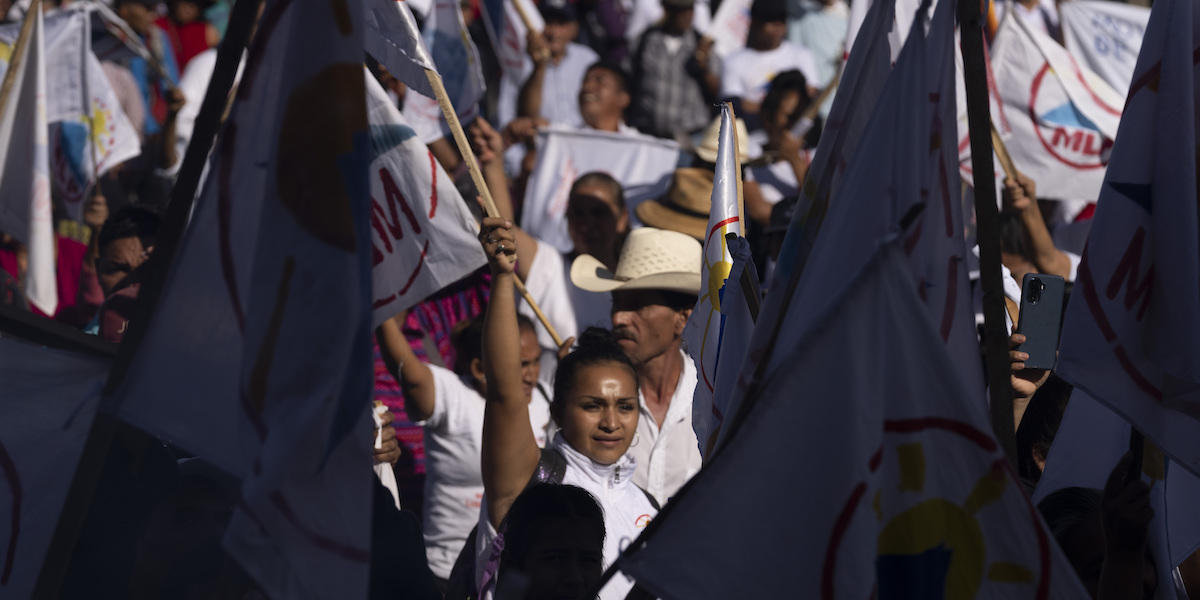On Sunday in Guatemala, a country of 17 million inhabitants and the largest in Central America, elections are held to elect the new president, renew the parliament and the 340 local administrations of the country. Attention is focused above all on the presidential elections, and in particular on the risk that they will push the country towards an even more authoritarian political system. José Rubén Zamora, one of the many journalists against whom there have been legal proceedings in recent years deemed politically motivated, called the current elections a «simulation of democracy».
Sunday we will vote to replace the outgoing president Alejandro Giammattei, who cannot be re-elected because the constitution prevents the incumbent president from running for office again. In the event that no candidate obtains at least 50 percent of the votes, the two who obtain the most will go to a runoff. There are 21 candidates in all, but only three are really contending for victory: Sandra Torres, given as the favorite and from the center party National Unity for Hope, Edmond Mulet, from the center-right Cabal party, and Zury Ríos Sosa, of the right-wing populist party Valor.
In recent years, Guatemala’s successive governments have adopted a series of measures that have increasingly weakened democracy and the rule of law. After extensive anti-government protests in 2015 that focused on government corruption and led to the resignation of President Otto Perez Molina and new elections, successive governments have responded increasingly repressively to displays of dissent. Both through violent police deployments and by adopting harassing and punitive measures against judges, journalists and activists who opposed governments.
In 2019, President Jimmy Morales expelled from the country the International Commission against Impunity in Guatemala (CICIG), an independent UN-backed body that was investigating him, accused of corruption, and which over time had detected a series of irregularities in which various prominent personalities of Guatemala’s politics and ruling class were involved.
Added to all this are some actions taken by outgoing president Giammattei, a former head of the prison police who attacked the independence of the judiciary, freedom of the press and assumed increasingly firm control of parliament. During his presidency, a series of ongoing investigations into both corruption and abuses committed during the civil war that lasted between 1960 and 1996, in which a total of about 200,000 civilians, mostly indigenous, were killed or disappeared.
– Read also: “elPeriódico” is closed, and Guatemala has a press freedom problem
The electoral campaign for these elections was reported by the correspondents who followed it as lacking in content. Torres, first lady of Guatemala from 2008 to 2011 when her husband Álvaro Colom was president, is among the candidates who presents an apparently more progressive program, with a lot of emphasis on strengthening public services and reducing the huge economic inequalities that characterize Guatemala.
It has garnered much support in the more rural areas of Guatemala and has very tough positions on security, to the point of being been compared to the populist president of El Salvador Nayib Bukele, known for having established an authoritarian regime and for prison policies contrary to respect for human rights with which he tries to fight local crime. In the past Torres has been accused of a series of irregularities in the management of her electoral campaign funds (this is the third time she has tried to become president): the most recent polls give her around 21 percent of the vote.
Sandra Torres (AP Photo/Moises Castillo)
Mulet, a former diplomat who served as Guatemala’s ambassador to both Europe and the United States, drew on his experience to present himself as a competent technician capable of modernizing the country, improving access to a number of key services and reducing youth unemployment. He has very rigid positions especially on civil rights: among other things he is against the right to abortion and same-sex marriages. Polls give him about 13 percent of the vote.
Edmond Mulet (AP Photo/Moises Castillo)
Zury Ríos Sosa is the daughter of the former dittatore Efraín Ríos Montt, condemned for genocide and crimes against humanity in 2013 (conviction later revoked in a very disputed of the Constitutional Court of Guatemala). Ríos Sosa, who has defended her father on several occasions claiming that he was innocent, stood out above all for his very hard and rigid positions towards security, similar to those of Torres. Polls of her give her about 9 percent.
Zury Rios Sosa (AP Photo/Moises Castillo)
One of the most commented aspects of these elections concerns the exclusion from the electoral campaign of a series of opposition candidates, against whom criminal proceedings have been initiated for charges related to alleged bureaucratic irregularities, considered by various analysts to be arbitrary and opaque.
Carlos Pineda, an entrepreneur who would run as an independent, told the Financial Times that a court prevented him from running by accusing him of failing to fill out a number of paperwork correctly. The same happened to Thelma Cabrera, an indigenous candidate known for her human rights activism: against her last February’s exclusion they protested thousands of people.
More generally, a progressive distrust of democracy seems to have spread among many inhabitants of Guatemala, perceived as a political system that over the years has not been able to resolve a series of structural problems, from corruption to economic inequalities to the functioning of a number of public services. Many people have left: between 2021 and 2022 over 230,000 Guatemalans emigrated irregularly to the United States. The remittances they send to those left today amount to about 15 percent of GDP.
